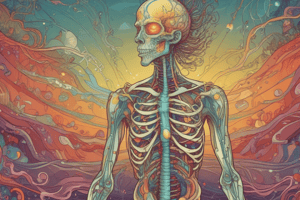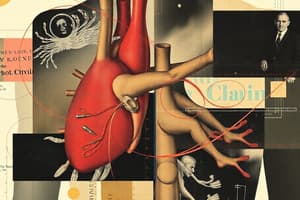Podcast
Questions and Answers
Which receptor subtype is primarily found in the neuro-effector junction of the Parasympathetic nervous system?
Which receptor subtype is primarily found in the neuro-effector junction of the Parasympathetic nervous system?
- M3
- M2
- M1 (correct)
- Nicotinic
Where is the M4 receptor subtype predominantly found?
Where is the M4 receptor subtype predominantly found?
- Exocrine glands
- Heart
- Basal ganglia (correct)
- Brain
Which receptor subtype is associated with increased K conductance in the heart?
Which receptor subtype is associated with increased K conductance in the heart?
- M1
- M2 (correct)
- M4
- M3
In which area of the brain is the M5 receptor subtype mainly located?
In which area of the brain is the M5 receptor subtype mainly located?
Which receptor subtype has weak muscarinic activity and is found in the CNS, Adrenal medulla, and Neuromuscular junction?
Which receptor subtype has weak muscarinic activity and is found in the CNS, Adrenal medulla, and Neuromuscular junction?
What happens to intracellular calcium levels upon activation of Acetylcholine signal transduction?
What happens to intracellular calcium levels upon activation of Acetylcholine signal transduction?
Which type of agent structurally related to acetylcholine is not destroyed by acetylcholinesterase?
Which type of agent structurally related to acetylcholine is not destroyed by acetylcholinesterase?
Which agent has muscarinic and nicotinic actions that may last up to 1 hour?
Which agent has muscarinic and nicotinic actions that may last up to 1 hour?
Which agent is used in the treatment of primary open-angle glaucoma and stimulates sweat, tears, and saliva production?
Which agent is used in the treatment of primary open-angle glaucoma and stimulates sweat, tears, and saliva production?
Which reversible inhibitor has a wide range of actions, stimulating both muscarinic and nicotinic receptors with a duration of 2-4 hours?
Which reversible inhibitor has a wide range of actions, stimulating both muscarinic and nicotinic receptors with a duration of 2-4 hours?
Which irreversible inhibitor covalently binds to the active site of acetylcholinesterase, leading to permanent inactivation?
Which irreversible inhibitor covalently binds to the active site of acetylcholinesterase, leading to permanent inactivation?
Which agent is primarily used for the diagnosis of myasthenia gravis with a shorter duration effect?
Which agent is primarily used for the diagnosis of myasthenia gravis with a shorter duration effect?
Which agent is an old drug that is still used to treat primary open-angle glaucoma?
Which agent is an old drug that is still used to treat primary open-angle glaucoma?
Which reversible inhibitor does not cross the blood-brain barrier but is effective in skeletal muscle?
Which reversible inhibitor does not cross the blood-brain barrier but is effective in skeletal muscle?
What is the primary function of muscarinic M2 receptors in the heart?
What is the primary function of muscarinic M2 receptors in the heart?
Where are muscarinic M4 receptors predominantly found based on the text?
Where are muscarinic M4 receptors predominantly found based on the text?
Which of the following receptor subtypes is primarily associated with exocrine glands and smooth muscle?
Which of the following receptor subtypes is primarily associated with exocrine glands and smooth muscle?
What is the main function of nicotinic receptors according to the text?
What is the main function of nicotinic receptors according to the text?
In which area of the brain is the M5 receptor subtype mainly located?
In which area of the brain is the M5 receptor subtype mainly located?
Which receptor subtype is responsible for the stimulation of sweat, tears, and saliva production?
Which receptor subtype is responsible for the stimulation of sweat, tears, and saliva production?
Which agent has a structural similarity to acetylcholine but does not have nicotinic action?
Which agent has a structural similarity to acetylcholine but does not have nicotinic action?
Which agent promotes the release of epinephrine from the adrenal medulla?
Which agent promotes the release of epinephrine from the adrenal medulla?
Which reversible inhibitor is used in myasthenia gravis and as an antidote for neuromuscular blockers?
Which reversible inhibitor is used in myasthenia gravis and as an antidote for neuromuscular blockers?
Which irreversible inhibitor leads to generalized cholinergic stimulation, paralysis of motor function, and convulsions?
Which irreversible inhibitor leads to generalized cholinergic stimulation, paralysis of motor function, and convulsions?
Which muscarinic agonist is specifically used in the treatment of Alzheimer's disease?
Which muscarinic agonist is specifically used in the treatment of Alzheimer's disease?
Which agent is not destroyed by acetylcholinesterase and is known for causing sweating, decreased blood pressure, and nausea?
Which agent is not destroyed by acetylcholinesterase and is known for causing sweating, decreased blood pressure, and nausea?
Which indirect acting agent is a reversible inhibitor used to decrease intraocular pressure topically?
Which indirect acting agent is a reversible inhibitor used to decrease intraocular pressure topically?
Which irreversible inhibitor is used in the chronic treatment of open-angle glaucoma?
Which irreversible inhibitor is used in the chronic treatment of open-angle glaucoma?
Which reversible inhibitor has a short duration effect and is used for the diagnosis of myasthenia gravis?
Which reversible inhibitor has a short duration effect and is used for the diagnosis of myasthenia gravis?
Which muscarinic agonist specifically treats primary open-angle glaucoma, acute angle closure, and Sjogren's syndrome?
Which muscarinic agonist specifically treats primary open-angle glaucoma, acute angle closure, and Sjogren's syndrome?
What is the primary function of muscarinic M4 receptors according to the text?
What is the primary function of muscarinic M4 receptors according to the text?
Which receptor subtype is mainly associated with mood, emotions, and the limbic system?
Which receptor subtype is mainly associated with mood, emotions, and the limbic system?
Where are nicotinic receptors primarily found based on the text?
Where are nicotinic receptors primarily found based on the text?
Which agent is known for its weak muscarinic activity and is primarily found in autonomic ganglia?
Which agent is known for its weak muscarinic activity and is primarily found in autonomic ganglia?
What is the primary location of nicotinic receptors according to the text?
What is the primary location of nicotinic receptors according to the text?
Which receptor subtype is responsible for activating second messengers such as protein G upon stimulation?
Which receptor subtype is responsible for activating second messengers such as protein G upon stimulation?
Which muscarinic agonist is known to have a strong muscarinic action but no nicotinic action?
Which muscarinic agonist is known to have a strong muscarinic action but no nicotinic action?
Which reversible acetylcholinesterase inhibitor is primarily used in the treatment of myasthenia gravis and as an antidote for tubocurarine and other neuromuscular blockers?
Which reversible acetylcholinesterase inhibitor is primarily used in the treatment of myasthenia gravis and as an antidote for tubocurarine and other neuromuscular blockers?
Which irreversible acetylcholinesterase inhibitor is used as an ophthalmic ointment for the chronic treatment of open-angle glaucoma?
Which irreversible acetylcholinesterase inhibitor is used as an ophthalmic ointment for the chronic treatment of open-angle glaucoma?
Which muscarinic agonist is specifically used for the treatment of Alzheimer's disease?
Which muscarinic agonist is specifically used for the treatment of Alzheimer's disease?
Which reversible acetylcholinesterase inhibitor has similar actions to Neostigmine and is an old drug used to treat primary open-angle glaucoma?
Which reversible acetylcholinesterase inhibitor has similar actions to Neostigmine and is an old drug used to treat primary open-angle glaucoma?
Which indirect acting agent is an irreversible inhibitor that is synthetically developed by the military as a nerve gas?
Which indirect acting agent is an irreversible inhibitor that is synthetically developed by the military as a nerve gas?
Which reversible acetylcholinesterase inhibitor has a wide range of actions and stimulates both muscarinic and nicotinic receptors with a duration of 2-4 hours?
Which reversible acetylcholinesterase inhibitor has a wide range of actions and stimulates both muscarinic and nicotinic receptors with a duration of 2-4 hours?
'Promotes release of epinephrine from adrenal medulla' is a characteristic associated with which agent?
'Promotes release of epinephrine from adrenal medulla' is a characteristic associated with which agent?
Which reversible acetylcholinesterase inhibitor does not cross the blood-brain barrier but exerts a greater effect in skeletal muscle?
Which reversible acetylcholinesterase inhibitor does not cross the blood-brain barrier but exerts a greater effect in skeletal muscle?
Which muscarinic agonist directly stimulates sweat, tears, and saliva production?
Which muscarinic agonist directly stimulates sweat, tears, and saliva production?
Flashcards are hidden until you start studying
Study Notes
Cholinergic Agonists Characteristics
- Acetylcholine (ACh) is the neurotransmitter of Cholinergic Neurons
- Synthesis, storage, release, binding to receptor, degradation, and recycling of ACh
Muscarinic Receptors
- Found primarily in the neuro-effector junction of the Parasympathetic nervous system
- Locations: Ganglia of PNS, Autonomic effector organs, Heart, Smooth muscle, Brain
- Subtypes:
- M1: Brain, exocrine glands, autonomic ganglia, stomach (gastric parietal cells)
- M2: Heart, brain, autonomic ganglia, smooth muscle
- M3: Exocrine glands, smooth muscle, brain, endothelial cells
- M4: Basal ganglia, amygdala, hippocampus (areas involved in mood, emotions, limbic system)
- M5: Substantia nigra (midbrain) function unclear
Nicotinic Receptors
- Weak muscarinic activity
- Locations: CNS, Adrenal medulla, Autonomic ganglia, Neuromuscular junction
Signal Transduction
- Activation of 2nd messenger (protein G)
- Increased intracellular [Ca]
- May stimulate or inhibit a secondary secondary enzyme
- M2 in the heart stimulates protein G, inhibiting adenylcyclase, increasing K conductance, decreasing heart rate and force of contraction
Direct Acting Agents
Acetylcholine
- Therapeutically of no importance due to multiplicity of actions and rapid inactivation
- Muscarinic and nicotinic actions:
- Decreased heart rate (vagal stimulation)
- Decreased blood pressure (vasodilation)
- Increased salivary secretions and motility in the eye
- Contraction of ciliary muscles with miosis (constriction of pupil)
Bethanecol
- Structurally related to acetylcholine but not destroyed by acetylcholinesterase
- No nicotinic action
- Strong muscarinic action:
- Increased intestinal motility and tone
- Stimulate detrusor muscle of bladder, promoting urination
- Applications: Urology (stimulation of bladder tone)
- Adverse effects: Generalized cholinergic stimulation, sweating, decreased blood BP, nausea, abdominal pain/diarrhea, bronchospasm
Carbachol
- Muscarinic and nicotinic actions may last up to 1 hour
- Actions:
- Systemic use causes profound effect on cardiovascular and gastrointestinal systems
- Promotes release of epinephrine from adrenal medulla
- Ophthalmic use reduces IOP
Pilocarpine
- Stable to hydrolysis by acetylcholinesterase
- Ocularly produces miosis and enhances accommodation
- Stimulates sweat, tears, and saliva production
- Therapeutic use: POAG, Acute angle closure, Pigmentary glaucoma, Sjogren's syndrome (oral administration) - xerostomia/xerophthalmia
- Adverse reactions: Potent stimulator of secretion of sweat glands
Indirect Acting Agents
Acetylcholinesterase Inhibitors
- Inhibit acetylcholinesterase enzyme responsible for the breakdown of used acetylcholine
- Indirectly stimulate both nicotinic and muscarinic receptors due to the consequential increase in available acetylcholine at the synapses site
Reversible Inhibitors
Physostigmine
- Actions: Wide range of actions; stimulates muscarinic and nicotinic receptors with duration of 2-4 hours
- Therapeutic use: Atony of intestines and bladder, promotes motility; Decreases intraocular pressure (topical)
- Overdose: Atropine, phenothiazine, Tricyclic antidepressants
- Adverse effects: Convulsions, bradycardia
Pyridostigmine and Ambenonium
- Use in myasthenia gravis (active 3-6 hours and 4-8 hours)
Neostigmine
- Doesn't cross BBB, but has greater effect in skeletal muscle
- Used in myasthenia gravis treatment and antidote for tubocurarine and neuromuscular blockers
Demecarium
- Similar action as Neostigmine
- Old drug to treat POAG
- Edrophonium: Like Neostigmine but shorter duration
- Use IV in the diagnosis of myasthenia gravis
- Tacrine, Donepezil, Rivastigmine, and Galantamine: Used in the treatment of Alzheimer's disease
Irreversible Inhibitors
Echothiophate
- Covalently binds to active site of acetylcholinesterase and permanently inactivates it
- Generalized cholinergic stimulation, paralysis of motor function, convulsions, and miosis
- Therapeutic use: Ophthalmic ointment for chronic treatment of open-angle glaucoma
- Pralidoxime: Used for organophosphate poisoning, Reactivation of acetylcholinesterase
Studying That Suits You
Use AI to generate personalized quizzes and flashcards to suit your learning preferences.




